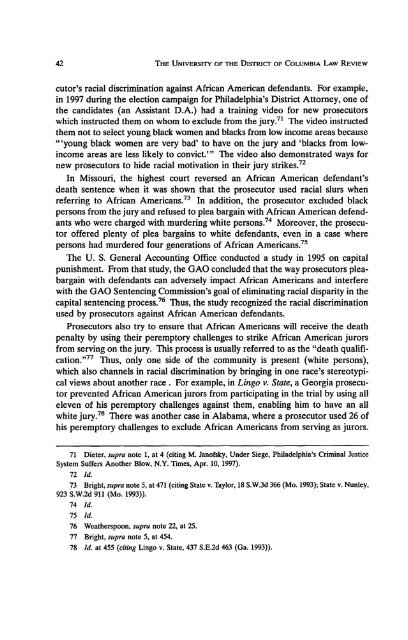The University of the District of Columbia Law ... - UDC Law Review
The University of the District of Columbia Law ... - UDC Law Review
The University of the District of Columbia Law ... - UDC Law Review
Create successful ePaper yourself
Turn your PDF publications into a flip-book with our unique Google optimized e-Paper software.
42 THE UNIVERSITY OF THE DISTRICf OF COLUMBIA LAW REVIEWcutor's racial discrimination against African American defendants. For example,in 1997 during <strong>the</strong> election campaign for Philadelphia's <strong>District</strong> Attorney, one <strong>of</strong><strong>the</strong> candidates (an Assistant D.A.) had a training video for new prosecutorswhich instructed <strong>the</strong>m on whom to exclude from <strong>the</strong> jury.71 <strong>The</strong> video instructed<strong>the</strong>m not to select young black women and blacks from low income areas because"'young black women are very bad' to have on <strong>the</strong> jury and 'blacks from lowincomeareas are less likely to convict.'" <strong>The</strong> video also demonstrated ways fornew prosecutors to hide racial motivation in <strong>the</strong>ir jury strikes.72In Missouri, <strong>the</strong> highest court reversed an African American defendant'sdeath sentence when it was shown that <strong>the</strong> prosecutor used racial slurs whenreferring to African Americans. 73 In addition, <strong>the</strong> prosecutor excluded blackpersons from <strong>the</strong> jury and refused to plea bargain with African American defendantswho were charged with murdering white persons?4 Moreover, <strong>the</strong> prosecutor<strong>of</strong>fered plenty <strong>of</strong> plea bargains to white defendants, even in a case wherepersons had murdered four generations <strong>of</strong> African Americans?5<strong>The</strong> U. S. General Accounting Office conducted a study in 1995 on capitalpunishment. From that study, <strong>the</strong> GAO concluded that <strong>the</strong> way prosecutors pleabargainwith defendants can adversely impact African Americans and interferewith <strong>the</strong> GAO Sentencing Commission's goal <strong>of</strong> eliminating racial disparity in <strong>the</strong>capital sentencing process?6 Thus, <strong>the</strong> study recognized <strong>the</strong> racial discriminationused by prosecutors against African American defendants.Prosecutors also try to ensure that African Americans will receive <strong>the</strong> deathpenalty by using <strong>the</strong>ir peremptory challenges to strike African American jurorsfrom serving on <strong>the</strong> jury. This process is usually referred to as <strong>the</strong> "death qualification.,,77Thus, only one side <strong>of</strong> <strong>the</strong> community is present (white persons),which also channels in racial discrimination by bringing in one race's stereotypicalviews about ano<strong>the</strong>r race. For example, in Lingo v. State, a Georgia prosecutorprevented African American jurors from participating in <strong>the</strong> trial by using alleleven <strong>of</strong> his peremptory challenges against <strong>the</strong>m, enabling him to have an allwhite jury,1B <strong>The</strong>re was ano<strong>the</strong>r case in Alabama, where a prosecutor used 26 <strong>of</strong>his peremptory challenges to exclude African Americans from serving as jurors.71 Dieter, supra note 1, at 4 (citing M. Jan<strong>of</strong>sky, Under Siege, Philadelphia's Criminal JusticeSystem Suffers Ano<strong>the</strong>r Blow, N.Y. TImes, Apr. 10, 1997).72 [d.73 Bright, supra note 5, at 471 (citing State v. Taylor, 18 S.W.3d 366 (Mo. 1993); State v. Nunley,923 S.W.2d 911 (Mo. 1993».74 [d.75 [d.76 Wea<strong>the</strong>rspoon, supra note 22, at 25.77 Bright, supra note 5, at 454.78 [d. at 455 (citing Lingo v. State, 437 S.E.2d 463 (Ga. 1993».














